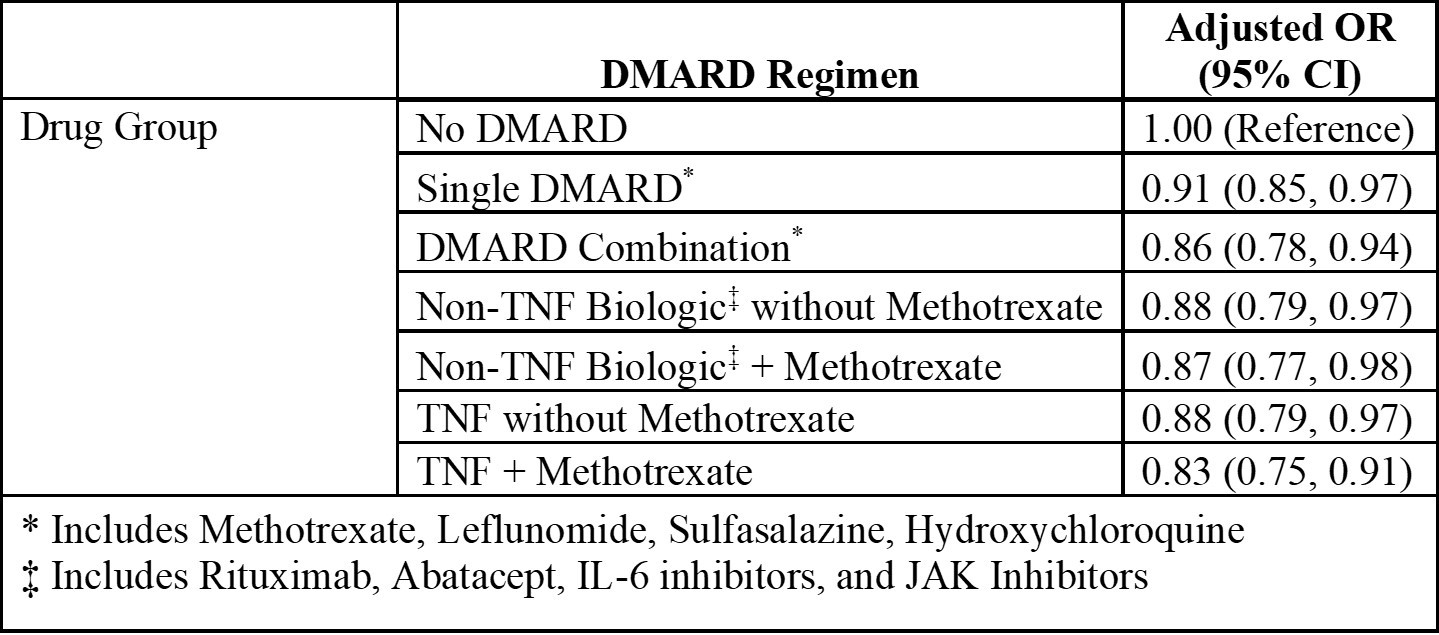Session Information
Date: Sunday, November 7, 2021
Title: Epidemiology & Public Health Poster II: Inflammatory Arthritis – RA, SpA, & Gout (0560–0593)
Session Type: Poster Session B
Session Time: 8:30AM-10:30AM
Background/Purpose: Patients with rheumatoid arthritis (RA) are at increased risk for opioid use. Disease-modifying antirheumatic drugs (DMARDs) have led to better control of disease activity. Whether this has led to decreased opioid use in RA patients for pain control is unclear. We thus conducted a cross-sectional study examining different types of DMARD use in patients with rheumatoid arthritis (RA) and its association with long-term opioid use using national Medicare database.
Methods: We identified a cohort of RA patients enlisted in Medicare database for the year 2017-18 who were receiving at least 30-day prescription of opioids. We evaluated the long-term opioid use in this cohort. Long-term opioid use was defined as receiving opioid prescription for at least 90 consecutive days. The risk of long-term opioid use was compared between DMARD users and non-DMARD users. Patients on DMARDs were further subclassified into regimens set forth by American College of Rheumatology (ACR) for treatment of RA. Demographics and risk factors including depression, anxiety, drug use, and opioid use disorder were also obtained.
Results: The study was composed of 27, 028 RA patients receiving opioid prescription for at least 30 days. The mean age was 69.7 years, 80% were female, 76.8% were Caucasian, and 11.7% were African American. Seventy percent of patients were on DMARDs. Long-term opioid use was lower among DMARD users compared to non-DMARD users (37.4% vs 43.3%). Risk factors for long-term opioid use were common in both groups but higher in non-DMARD users (anxiety 42.8% vs 31.9%, depression 43.6% vs 36.6%, previous drug abuse 18.6% vs 12.2%, and previous opioid use disorder 17.0% vs 11.0%). After adjusting for these factors, the odds of long-term opioid use was significantly lower among DMARD users compared to non-DMARD users (OR 0.89, 95% CI 0.84-0.93). The odds remained low irrespective of DMARD regimen (Table 1).
Conclusion: DMARD use in RA patients was associated with decreased risk of long-term opioid use. These agents represent a possible opportunity to lower the risk of long-term opioid use in an especially vulnerable population. Appropriate use of DMARDs in RA patients may result in decreased dependence on opioids for chronic pain.
To cite this abstract in AMA style:
Sood A, Kuo Y, Westra J, Raji M. DMARD Use in Medicare Patients with Rheumatoid Arthritis and Risk of Long-Term Opioid Use [abstract]. Arthritis Rheumatol. 2021; 73 (suppl 9). https://acrabstracts.org/abstract/dmard-use-in-medicare-patients-with-rheumatoid-arthritis-and-risk-of-long-term-opioid-use/. Accessed .« Back to ACR Convergence 2021
ACR Meeting Abstracts - https://acrabstracts.org/abstract/dmard-use-in-medicare-patients-with-rheumatoid-arthritis-and-risk-of-long-term-opioid-use/

